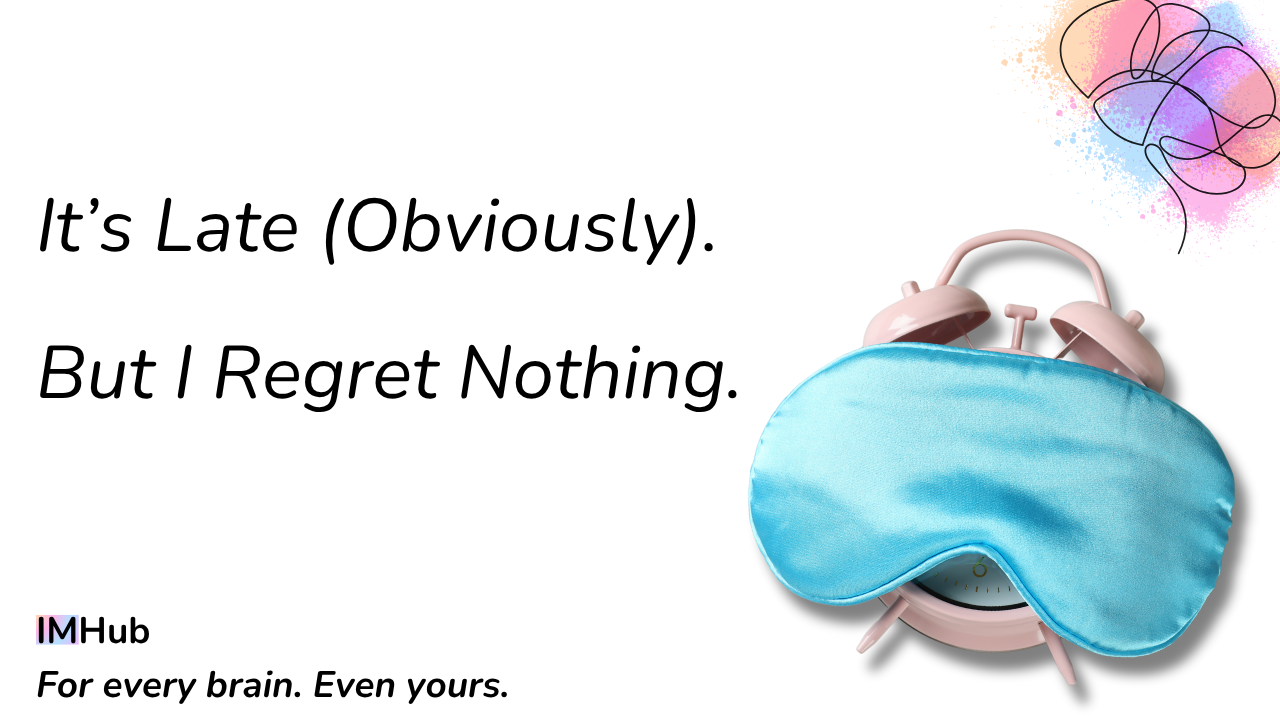This One’s Dedicated to the Time-Blind Massive...
Jun 07, 2025
So… yes. It’s the 6th of June.
Yes, this was meant to go out on the 3rd.
But look—it’s still June, it’s still relevant, and frankly, if you’re reading this? It arrived exactly when it needed to.
Because I didn’t build the IMHub to follow someone else’s calendar.
I built it to follow real people—with real brains, real lives, and real demands.
Now, before anyone comes at me with colour-coded calendars and 15-minute buffer schedules... Let’s talk about time blindness.
Wait, What Even Is Time Blindness?
Time blindness isn’t just “bad time management.”
It’s not solved by a new planner or a better app (trust me, I’ve downloaded 17).
It’s a neurological challenge that affects how we perceive and engage with time.
People with ADHD (hi, hello, me) or other neurodifferences often struggle with what researchers call temporal discounting¹.
Basically:
-
If it’s not now, it’s not real.
-
If it is now, it’s very real... and suddenly, everything else is not.
It’s like having no internal clock... just an emotional weather system.
Time either feels urgent and overwhelming or invisible and irrelevant.
Even with alarms, wall planners, and that one friend who texts “YOU HAVE A THING IN 5 MINUTES,” I still end up frantically doing life admin at 10:54pm because I swear it was 3pm two minutes ago.
We can care deeply and still miss it.
Because our brains don’t register time like everyone else’s.
It doesn’t tick. It thuds. And then disappears.
Example: A Personal Favourite
I’ve forgotten our wedding anniversary more times than I’ve remembered it! 😳
Even on the rare occasion I do remember, I still forget to get the ever-suffering husband a card. 😩
I usually only clock on that it’s the day when he hands me an anniversary card, and without fail, I give him that side-eye look, like he’s either about to ask for something massive… or quietly sliding me divorce papers.
It’s become a bit of a ritual now. The man deserves a medal. Or a refund.

Meanwhile, I’ve got a stash of untouched anniversary, valentine’s, birthday cards, thank you cards and i think ive even got a couple of good luck in your new job and home ones too in my dresser... just stockpiling them like emotional backup plans.
However, last year I hatched a cunning plan and launched Operation Redemption.
Back in my RAF days — especially when I lived in Cyprus — we used to send each other letters and daft little cards.
Funny ones. Soppy ones. Sweary ones.
(Yes, we’re that old. We wrote with actual pens. Used the post. Had to wait for comms — shock horror.)
Anywho, that all fizzled out when I left and came home for good.
So last year, I brought it back!
Now I randomly leave him notes and cards around the house, or sneak them into his work bag throughout the whole year.
Some are ridiculous and make him laugh.
Some are proper soppy (not gonna lie).
But he loves them and it reminds him that even if I forget the occasion, I never forget how bloody daft I am about him.
And honestly?
It eases a lot of the guilt, anxiety, and pressure for me too.
#Win #Redemption

Alt Text: The ever-suffering husband standing in a doorway, smiling while holding a red envelope and a white card that reads: “One day you'll find this card in a drawer & know I love you now, I loved you then, I love you always.” His tattooed fingers are visible, and he’s wearing glasses and a black t-shirt.
Operation Redemption In Action: Look At That Face!
Time’s the Prick. Not Us.
Time blindness isn’t laziness.
It’s not disorganisation.
It’s not that we don’t care.
And it sure as hell isn’t fixed by colour-coding another to-do list.
People with ADHD and other neurodifferences often experience time more emotionally than logically¹.
We don’t just watch the clock... we feel it. Ticking. Judging.
Like a guilt-soaked metronome that speeds up precisely when we need it to slow down.
Some days it trickles.
Some days it vanishes.
And some days?
It sprints past with both middle fingers up shouting, “GOOD LUCK, LOSER,” as we realise it’s somehow already next Tuesday and we’ve eaten cereal for three meals.
Our brains operate on two modes: Now and Not Now².
So yeah, we miss appointments.
We forget the email from three days ago.
We hyperfocus for six hours making a resource nobody asked for… instead of the one due in two days.
(But hey — it’s in the IMHub now. Silver linings.)
Time doesn’t behave for us.
It doesn’t tick. It jazzes.
Except instead of saxophones, it’s random calendar alerts and cold mugs of tea.
The worst bit?
It’s not just inconvenient... it can be proper shamey. (Another bonified word from the Ria dictionary)
- Because we know we’re late. Again.
- We know we promised. Again.
- And we care. So bloody much.
Which is why it stings when we feel like we’re constantly letting people down… including ourselves.
You can’t willpower your way out of a warped relationship with time.
Trust me, I’ve tried.
With Alarms, apps, and enough post-its to wallpaper a small bungalow.
What does help?
-
Not being treated like you’re doing it on purpose.
-
People who get it, not guilt-trip it.
-
Tools that bend instead of break.
-
Space to talk about it without being labelled lazy or flaky.
That’s what we’re building.
Not a solution for time, but space around it.
Because time is a prick.
But you’re not.
Here’s What I Know (And the Science Backs Me Up)
- Shame doesn’t improve executive function. It actually increases cognitive load and makes it harder to do anything³.
- Self-compassion is proven to boost motivation and follow-through over time⁴.
- People learn better — especially neurodifferent people — when spaces are safe, flexible, and emotionally honest⁵.
TL;DR: Judging yourself for being late doesn’t make you early.
It just makes you miserable. And tired. And more likely to avoid the thing completely.
Bringing It Home Now...
The IMHub wasn’t built to reward inbox-zero vibes, polished punctuality, or the pressure to “have it all together.”
Those standards?
They’re rooted in a neuronormative culture that expects everyone to tick along one tidy timeline... the efficient, scheduled, and emotionally bulletproof one.
But the world doesn’t run on one type of brain.
And life doesn’t work like a perfectly synced planner.
The IMHub?
It’s built to honour you... exactly as you are.
Whether you’re in the Time-Bound Massive, the Time-Blind Massive, or somewhere messily in between.
We’re not here to chase perfection.
We’re here to make space for presence.
For humanity.
For all the glorious, inconsistent ways real people show up.
And That Same Grace? It Applies to Me, Too.
I’m not running the IMHub from some polished productivity pedestal.I’m also here, in the thick of it, with half-written notes, WhatsApps, voice memos, and tabs I swear I’ll get back to.
If I’m going to ask people to show up exactly as they are, then I’ve got to do the same.
So yeah, June’s blog is a few days late.
AND -
I’m not sorry.
I'm not ashamed.
I’ll always choose reality over performance.
This is the reality:
I got caught up in 40 tabs, 3 voice notes, 6 WhatsApp threads, a rogue Canva project, and life.
Times a prick for me.
I want to be the kind of leader who models radical permission.
- Permission to be human
- To get it wrong
- To reset without self-hate.
So here it is.
June’s blog. Late, but full of truth.
Because that’s the only kind of blog worth writing reyt?
Ria x
References
¹ Barkley, R. A., et al. (2001). Time perception and time-based prospective memory in ADHD.
https://doi.org/10.1016/S0891-4222(01)00117-2
² Brown, T. E. (2005). Attention Deficit Disorder: The Unfocused Mind in Children and Adults. Yale University Press.
https://yalebooks.yale.edu/book/9780300106411/attention-deficit-disorder
³ Sibley, M. H., et al. (2014). The role of shame in ADHD-related impairments.
https://doi.org/10.1007/s10802-014-9895-2
⁴ Neff, K. D., & Germer, C. K. (2013). The Mindful Self-Compassion Program.
https://self-compassion.org/the-program/
⁵ Price, M. (2022). Cripistemologies and Neurodiversity: Supporting Inclusion Through Design.
https://link.springer.com/article/10.1007/s10648-022-09654-8

Meet Ria Jackson: SHE-EO and Chief - Brewmaker of IMUK
Forget a closet full of clothes, Ria has a hat rack overflowing with experiences! Engineer, educator, mindset coach, NLP practitioner and coach, specialist study skills tutor for ADHD and Autism, trauma-informed practitioner, senior leader, and the list goes on!
She brings a wealth of experience, shaped by her journey as a neurodifferent woman, veteran, and Mum (her whole family is basically a full neurodiversity ad campaign in itself!)
Ria's life and career have been anything but linear!
Now, as the SHE-EO of IMUK, she brings a wealth of experiences and a unique perspective.
Sick of the same old, same old, and wanting to forge a better future for her neurodifferent daughter, Ria's here to disrupt the system!
With a background as diverse as her passions, she's on a quest to make neuroinclusion the new normal.
She believes in authenticity and leaving a positive impact, as evidenced by her closing quote:
"Always be yourself, cos everyone else is already taken!"
(Oscar Wilde, apparently).
Welcome to IMUK!
Want to Work With Us?
Whether you’re a solo human figuring yourself out, a manager trying to stop your team burning out, or an organisation finally ready to do more than tick a box — we’ve got you.
At Inclusive Minds UK, we offer:
-
The IMHub — your go-to community for real talk, real tools, and real brains (no pretending required)
-
Culture Clinics —interactive workshops and practical support to actually move the dial on inclusion
-
Gob for Hire — raw, powerful keynote talks that actually make people think (and laugh, and probably cry a bit)
-
Power Hours — one-off sessions to deep dive, untangle, or plan the next right step for your team or your brain
No corporate shiz. No jargon. Just properly inclusive, human-first support, built by humans for humans.
Still thinking about it?
No worries, why not try:
-
Our free quiz: How Neuroinclusive Are You—Really?
-
Or join the waitlist for our free 3-Day Challenge: Stop Pretending: A Challenge to Radical Self-Acceptance
And in a fine example of how we build nothing about you without you...
Why not join in our poll to help decide when we should run the next free challenge?
-
End of July
-
Early September
-
Whenever my brain lets me join, tbh
Click Here To Vote
Don't miss a beat!
Subscribe to the blog now!
We hate SPAM. We will never sell your information, for any reason.

